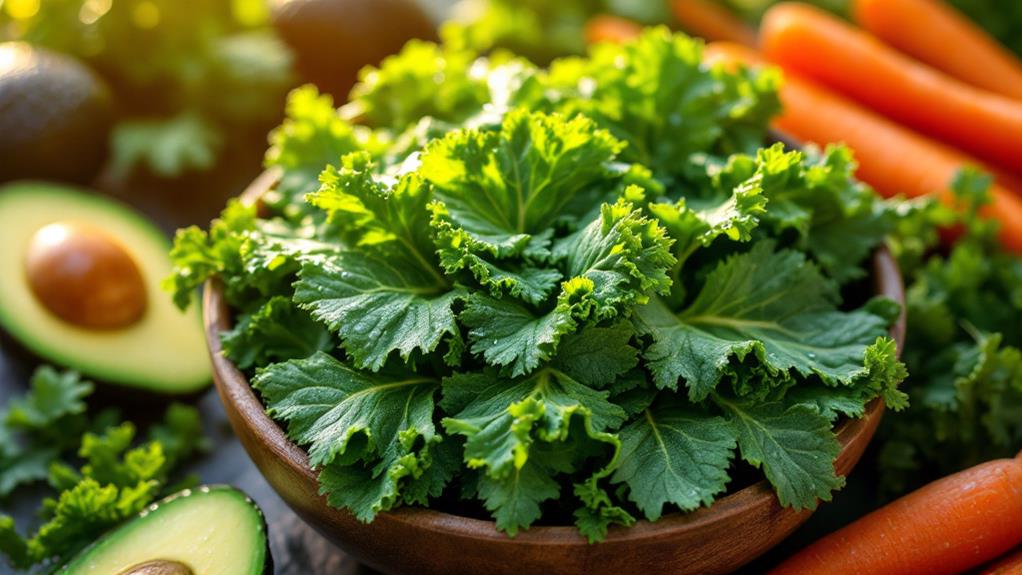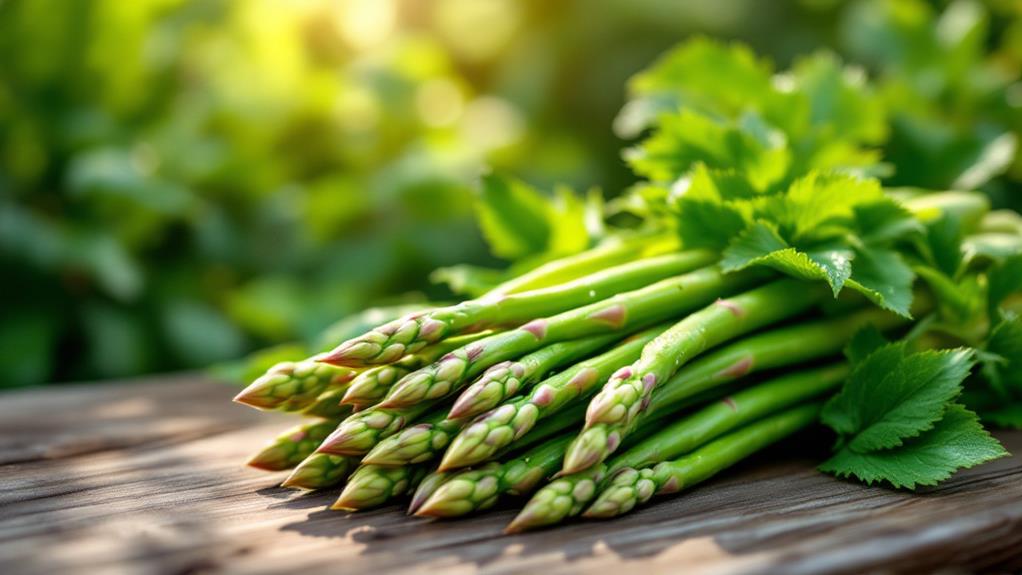Kale Is Cool and Here’S Why: the Health Benefits of This Super Green

You're about to uncover why kale truly lives up to its super green status. It's loaded with over 900% of your daily vitamin K and offers ample vitamin A and C for bolstering your vision, immune system, and skin. This leafy green provides potassium, which helps regulate blood pressure, and has antioxidants like quercetin for fighting chronic disease. The sulforaphane in kale may also inhibit cancer cell growth. Plus, with diverse culinary uses, kale is as versatile as it is nutritious. Reveal how this nutrient powerhouse can transform your diet and improve overall health even further.
Nutritional Powerhouse
Packed with a remarkable array of nutrients, kale stands out as a true nutritional powerhouse. When you explore its nutritional content, you'll find it hard to match. Just one cup of raw kale delivers over 900% of your daily vitamin K needs, playing a vital role in bone health and blood clotting. Besides vitamin K, kale is rich in vitamin A, which supports vision and immune function. It's not just vitamins, though; kale is also a fantastic source of fiber, with a single cup of cooked kale offering 5.72 grams. This contributes greatly to your daily fiber requirement, aiding digestion and promoting heart health.
Kale doesn't stop there. It provides a generous amount of calcium, with 354 mg per cup, fundamental for maintaining strong bones and teeth. Vitamin C is another highlight, with 91.1 mg per cup, enhancing your immune system and skin health. The antioxidants in kale, including quercetin and kaempferol, offer impressive health benefits by reducing inflammation and fighting free radicals. These leafy greens truly pack a punch, making them a must-have in your diet if you're looking to improve general wellness.
Disease Prevention
In regard to disease prevention, kale is a powerhouse you shouldn't overlook. This super green is packed with antioxidants like quercetin and kaempferol, which help combat oxidative stress. By doing so, they reduce the risk of chronic diseases, including certain cancers. The cruciferous nature of kale means it contains sulforaphane, a compound known for its potential to fight cancer by reducing the growth of cancer cells. So, incorporating kale into your diet isn't just about staying healthy now; it's about protecting your future health too.
Kale's health benefits extend to protecting you from diabetes. Thanks to its high fiber content, kale improves insulin sensitivity and lowers the risk of developing type 2 diabetes. It's a simple yet effective way to keep your blood sugar levels in check. Moreover, kale is a rich source of vitamin K, which supports bone health and might lower the risk of osteoporosis and fractures.
Furthermore, kale's potassium content plays a significant role in disease prevention. It helps lower blood pressure, reducing the risk of heart disease and stroke. With all these benefits, kale truly deserves its reputation as a super green.
Heart Health Benefits

Kale often shines as a heart-healthy superfood you shouldn't ignore. It's packed with nutrients that support your cardiovascular system, making it a fundamental addition to your diet. One of kale's standout features is its rich potassium content—485 mg per cup—which plays an important role in regulating blood pressure. By helping to balance sodium levels in your body, potassium can greatly reduce the risk of cardiovascular diseases.
The fiber in kale also makes a considerable contribution to heart health by lowering cholesterol levels. High cholesterol is a major risk factor for heart disease, and incorporating fiber-rich foods like kale can help keep your cholesterol in check. Studies have shown that consuming kale powder daily can effectively reduce LDL (bad) cholesterol levels, improving general heart health markers.
Moreover, kale is a source of omega-3 fatty acids, known for their ability to reduce inflammation and support cardiovascular function. These healthy fats are necessary for maintaining a healthy heart. By regularly including this super green in your meals, you may lower blood pressure, as research indicates that steamed kale is particularly effective. Accept kale's heart-boosting benefits to improve your well-being.
Cancer-Fighting Compounds
Beyond its heart-health benefits, kale also offers impressive cancer-fighting properties. By incorporating kale into your diet, you're not just adding a leafy green; you're embracing a powerhouse of compounds that can help inhibit cancer cell growth. Sulforaphane and indole-3-carbinol, found abundantly in kale, are key players in this fight. They potentially stop cancer cells in their tracks, making kale a formidable ally against this disease.
Kale's high antioxidant content, including vitamins C and K, serves as a shield against oxidative stress. This stress causes cellular damage and may lead to cancer development. By combating this damage, antioxidants protect your cells and contribute to general health. Furthermore, kale's role as a cruciferous vegetable means it's packed with fiber and phytonutrients, both linked to a reduced risk of cancers, especially colorectal cancer. Fiber not only aids digestion but also promotes detoxification and regular bowel movements, further lowering colorectal cancer risks.
Antioxidants in kale, such as quercetin and kaempferol, also work to reduce inflammation in your body. By lowering inflammation, these antioxidants can decrease the risk of chronic diseases, including cancer, positioning kale as an essential component of a cancer-preventative diet.
Skin and Eye Health

Your skin and eyes reap significant benefits from kale's nutrient-rich profile. Packed with antioxidants like quercetin and kaempferol, kale shields your skin from oxidative stress, which can cause irritation and premature aging. This leafy green's high vitamin C content is vital for collagen production, ensuring your skin remains elastic and youthful. Collagen is a protein that supports skin structure and prevents sagging, making vitamin C a key component for maintaining skin health.
Turning to eye health, kale is rich in lutein and zeaxanthin, two carotenoids that reduce the risk of macular degeneration and cataracts. These nutrients improve your comprehensive eye function and protect your vision from age-related issues. Moreover, the combination of vitamin A and antioxidants in kale enhances night vision and overall eye health, helping you see clearly in low-light conditions.
Regular consumption of kale also improves skin hydration and appearance. Its nutrient-rich profile keeps your skin looking fresh and lively. By incorporating kale into your diet, you're providing your body with the tools it needs to maintain healthy skin and eyes, ensuring you look and feel your best. Kale isn't just a super green; it's a super advantage for your skin and eye health.
Culinary Versatility
Regarding culinary versatility, you'll find kale to be an exceptional ingredient that fits seamlessly into many dishes. Regardless of whether you enjoy it raw in salads or blended into smoothies, kale provides a crunchy texture and a substantial nutritional enhancement. It's rich in vitamins A, C, and K, making it a fantastic supplement to your diet. For those who enjoy cooked preparations, sautéing or steaming kale retains its firm texture while elevating the flavors of stir-fries and soups. This flexibility makes it a valuable component in diverse culinary creations.
If you're looking for a healthy snack, consider transforming kale into crispy chips. Simply bake it with a light drizzle of olive oil and your choice of seasonings. The result is a low-calorie, nutrient-dense snack that satisfies the crunch craving. Kale's versatility extends to pasta sauces and dressings, where it subtly increases nutritional content without overpowering flavors. With different types like curly, Lacinato, and Red Russian, kale offers unique flavors and textures. These variations allow you to investigate a wide range of preparations and presentations, ensuring your meals remain exciting and healthy. Kale truly shines as a versatile culinary powerhouse.




